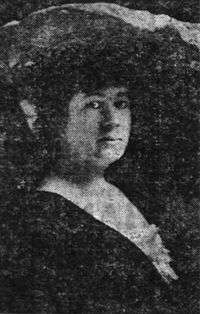Harriet Richardson
| Harriet Richardson | |
|---|---|
 | |
| Born |
May 8, 1874 Washington DC |
| Died | March 28, 1958 (aged 83) |
| Resting place | Arlington National Cemetery |
| Thesis | Contributions to the Natural History of the Isopoda (1904) |
Harriet Richardson Searle (9 May 1874–28 March 1958) was an American carcinologist.
Biography
Richardson was born on 9 May 1874 in Washington DC to Charles and Charlotte Ann Richardson.[1] She attended Mount Vernon Seminary in Washington before attending Vassar College - where she became interested in biology - from which she graduated in 1896 with a BA, and again with a master's degree in zoology in 1901.[1][2] In 1901 Richardson was appointed 'Collaborator in the Division of Marine Invertebrates' at the National Museum of Natural History. She earned her PhD in the same field from George Washington University in 1903.[1]
Richardson married William Searle in 1913 with whom she had one child, named William, in 1914.[1] Her son had a mental or physical handicap, resulting in a large amount of her time being spent looking after him.[1]
Richardson died at Hahnemann University Hospital on 28 March 1958.[3]
Research
Richardson began publishing papers on isopoda in 1897; her first study was on the Socorro Isopod and she went on to publish a total of 80 papers.[1] Her best known work was A Monograph on the Isopods of North America, published in the Bulletin of the U.S. National Museum.[1] Over the course of her career Richardson described over 70 new genera and nearly 300 new species of isopods and tanaids, many of which she named after colleagues or those who gifted collections to her.[1] In turn the isopod species Caecidotea richardsonae and harpacticoida copepod genus Harrietella, among many others, are named after her.[1] After the birth of her son Richardson had to spend a large amount of time caring for him and thus spent less time on her research,[1] publishing papers only occasionally, with her last in 1919.[4]
References
- 1 2 3 4 5 6 7 8 9 10 David M. Damkaer (2000). "Harriet Richardson (1874-1958), First Lady of Isopods". Journal of Crustacean Biology 20 (4): 803–811. doi:10.1163/20021975-99990102. Retrieved 11 April 2014.
- ↑ "Fair Women Seeking Secrets of Plant and Animal Phenomena". The Washington Post. 22 October 1905. Retrieved 5 August 2014 – via Newspapers.com.

- ↑ The Washington Post. 30 March 1958. p. A18. Missing or empty
|title=(help) - ↑ Frank Truesdale (1993). History of Carcinology. CRC Press. p. 168. ISBN 9054101377. Retrieved 11 April 2014.